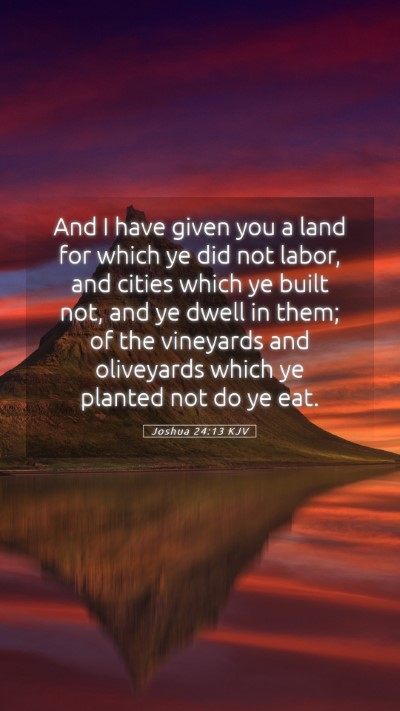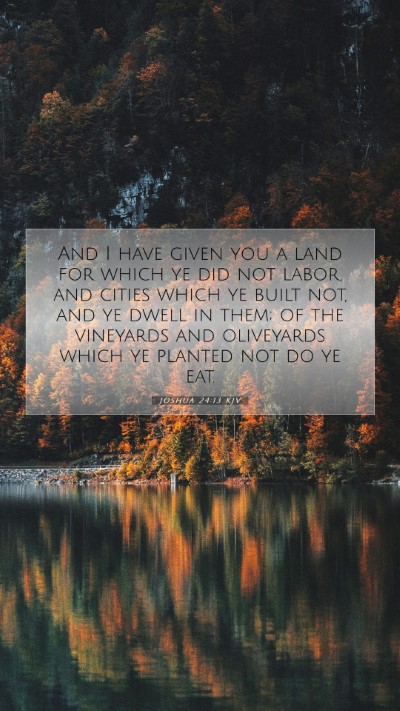Bible Verse Commentary: Joshua 24:13
Verse: "And I have given you a land for which you did not labor, and cities which you built not, and you dwell in them; of the vineyards and oliveyards which you planted not do you eat." (Joshua 24:13)
Overview and Context
This verse occurs toward the end of Joshua's address to the Israelites as they are about to enter into covenant with God, reaffirming their commitment to Him. Securing their land involved God's intervention, allowing them to possess cities and resources they had not worked for.
Meaning of Bible Verses
The essence of this verse highlights the grace and providence of God, demonstrating how He provided the Israelites with abundant blessings without their direct labor. It serves as a reminder of God's faithfulness and generosity, emphasizing that spiritual and material blessings often stem from divine favor.
Bible Verse Interpretations
- Matthew Henry: Henry reflects on this passage as showcasing God's mercy and grace, depicting a God who gives abundantly even when His people are unworthy. His commentary emphasizes the importance of recognizing and acknowledging these gifts.
- Albert Barnes: Barnes notes that the Israelites received the land not only as a reward for their efforts but as a sign of God's covenant with them. He underscores the importance of appreciation for what one has been given.
- Adam Clarke: Clarke elaborates on the significance of the cities and provisions, highlighting the contrast between God's plentiful gifts and the Israelites' previous struggles. He encourages acknowledgment of divine providence in mundane life.
Understanding Scripture
This verse reinforces essential biblical themes: God's grace, human gratitude, and the covenant relationship between God and His people. A deeper understanding comes from recognizing that while efforts and labor are valuable, the ultimate source of all blessings is God.
Application of Bible Verses to Daily Life
In practical terms, believers can learn to cultivate an attitude of gratitude for the blessings in their lives. This scripture calls to rely on God's provision, encouraging individuals to reflect on their lives and acknowledge where God's favor has manifested, often in unexpected ways.
Bible Study Insights
This verse can serve as a springboard for discussion in bible study groups, emphasizing how God's gifts can be both physical and spiritual. The group can explore implications of receiving unearned blessings in their personal lives.
Cross References
- Deuteronomy 6:10-11: Discusses the blessings of the land that one did not labor for.
- Psalm 127:1: Reminds us of the necessity of God's involvement in our endeavors.
- James 1:17: Emphasizes that every good gift comes from above, reinforcing the principle behind Joshua 24:13.
Summary
In summary, Joshua 24:13 illustrates the unfathomable generosity of God and challenges individuals to reflect on their own lives, recognizing the unearned blessings they have received. It can encourage a spirit of thankfulness and inspire believers to trust in God's continuous provision. As we delve into Bible verse meanings and interpretations, let this passage serve as a reminder of our place within the broader narrative of God's covenant with His people.


